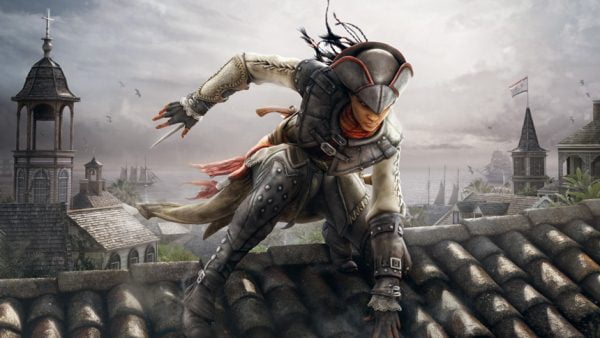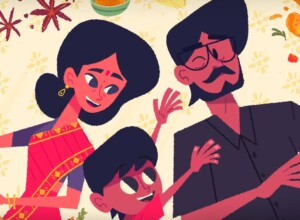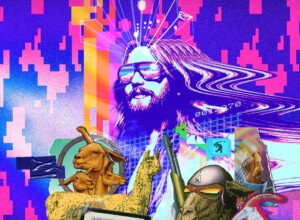Should we give much thought to the gender, race, age or even sexual orientation of characters we see in games?
I didn’t. Until I came across Dead Space.
I played the first Dead Space and really enjoyed it, partly for its gripping take on space horror and the perfect, scare-inducing atmosphere. But also because the character was a mystery. He had a name, yes, but I never saw who he really was. This meant that I could at least invent my own version of who he was in my mind and play as that.
But then all was revealed in the sequel. The veil fell and the illusion was broken. He wasn’t African as I thought. The developers could have gone with that, but didn’t. Yeah… How typical, I thought.
The game industry is young. In comparison to more established types of entertainment like music or even film, it really is a new breed. Since the first text-based adventures, gaming has changed dramatically.
Within the space of about 35 years, we’ve had revolutionary new experiences. Entirely new genres have been created. We’ve been able to save princesses in platformers, engage in one on one battles in fighting games, speed along the tarmac in racing games, explore massive worlds in RPGs and MMOs, among many others. Never mind the innovations in indie gaming, online play and motion controls!
To complement these developments, graphics have seen vast improvements. From only a few lines on a black background, to colourful sprites, the emergence of 3D worlds and recently near life-like visuals, the industry has moved quickly. With that, stories have become more elaborate and characters have grown richer.
But, still, gaming has been slow in dealing with one issue: creating characters that go beyond what we’ve traditionally seen as the protagonist.

From games created by the smallest teams to triple-A titles developed with multi-million pound budgets, this has been the status quo. Call of Duty, Metal Gear Solid, Uncharted, Red Dead Redemption, Braid, Dead Space, Bioshock, Mass Effect! Granted, the last one lets you change how your character looks. But the face on the cover, the one in the trailers and the one in the stories played by many gamers would be the same.
Why is this an issue? Firstly, as I’ve talked about already, the industry has moved on so quickly, adapting and innovating in the short time it has existed so far. Secondly, it’s had a massive impact on society and has deservedly gained more respect as an art. Many people look towards games for inspiration.
A 2009 study carried out by the University of Southern Carolina, US, suggested that 47% of gamers were female. A report from last year by the Entertainment Software Association noted that 45% of people in the US who played video games were female. So my third point would be that the gender balance of today’s gamers is generally reaching equilibrium and players are of various racial ethnicities.
It’s difficult to find reliable and recent statistics on this, but I would hope that there has also been an improvement in the representation of women, various ethnic groups and members of the LGBT community in the industry’s workforce (but there is still a long way to go).
In short, gaming is open to everyone. Everyone is involved and has an investment. There is demand for the experiences given in a what might appear to be a typical shooter – but one that defies the rules and portrays a truly unique perspective. Instead, writers often resort to drawing on stereotypes to flesh out characters.
Portrayals of women are the worst victims of this, closely followed by various ethnic groups. For example, developers have often felt the need to characterise in-game black, east Asian, Mexican, even eastern European characters as incapable of speaking “proper” English. For the black characters, the default language given to them is “gangsta”. I would class this decision making as borne out of laziness. Rather than take the time to research and build interesting ethnic characters, there is a tendency to stick to tropes.
Women characters are sexualized across the board in all types of games. The Remember Me controversy was one of the biggest but there are others that stand out including the release of the Dead Island Riptide statue. This I consider to be active decision-making, where action is taken with the aim of such “sexification” being to maximise profits. Why? Because sexy sells games, apparently.
But not all is lost and there has been some progress, for example within the Assassin’s Creed series. The series as a whole has made strong progress on this subject. That is with the exception of the first entry’s Altair, a half-hearted effort that shows it will take some time before we can see genuine Arab characters.
Recently, Ubisoft released the Freedom Cry downloadable content (DLC) for Assassin’s Creed IV: Black Flag. In this, you play as Adéwalé, a slave who gains his freedom as a pirate and eventually becomes an assassin. The DLC touches upon slavery and emancipation and the developers have been brave in depicting this kind of setting in a video game. There are similarities to Django Unchained, which was a brilliantly unique perspective on this specific issue.
Aveline, the star of Assassin’s Creed: Liberation, is another great example of a well-built character that defies the archetype. Why can’t more games build strong, realistic back stories for women who just happen to be African? Yes, I understand Aveline is African-French but I still give Ubisoft some credit.

However this alone doesn’t solve the issue. As Hannah (Freedman) acknowledged in a recent Thumbsticks article, developers have made great strides in creating strong roles for women but Hannah pointed out (and rightly so) that more work needs to be done.
As an example, Mirror’s Edge also did away with tradition and had a half Chinese girl grace the box art. Despite being positively received for this and enjoyed as a fun and solid game by many fans, Electronic Arts didn’t seem inspired enough to commit to a follow up.
Granted, gaming isn’t the only branch of entertainment that has so far failed to fully address this need for greater diversity. I also appreciate that game development isn’t easy. It takes years of hard work and commitment by dedicated and enthusiastic teams. Developing a game can be a costly venture and I understand developers want reassurance that these efforts will grant rewards.
But players want to see these unique characters and so developers should embrace this opportunity. Stronger efforts should be made, not simply for financial gain, but for the reward of pushing boundaries.
By drawing on authentic experiences of both men and women of varied heritage – racial, religious, cultural etc – developers can build more realistic stories and richer characters.
And when that truly happens, we can all enjoy the benefit of playing such unique experiences.
–
Sources:
New Scientist – Video games need a more diverse cast of characters
Entertainment Software Association – 2013 Essential Facts About the Computer and Video Game Industry (pdf)






